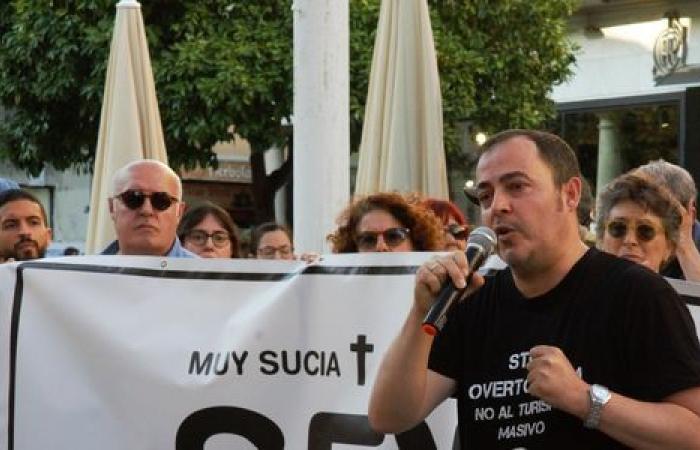“We absolutely wanted a city in Spain. A relaxed place, where there is a lot to visit,” explains Laurie, 27 years old. “And the sun!” We don’t necessarily have them in Normandy,” laughs Kevin, 30 years old. The young couple takes a break in the shade, in the courtyard of the Orange Trees of the Alcazar, one of the two most visited monuments in Seville, in Andalusia, southern Spain. The heat remains mild and the streets are still calm this Wednesday, June 26, shortly before 6 p.m. This is rare at this time. Especially at the exit of the medieval Jewish quarter, in Santa Cruz, the most visited area in the region. “It’s pretty and colorful. It looks friendly and it moves,” judges Laurie, seduced by this tangle of cobbled streets which connect small rectangular squares decorated with a fountain.
But this success has a bitter taste for some. “Everything is designed for visitors. In the streets, you only find tourists, bars, tables and chairs,” regrets Lola Garcés, in her sixties, who has lived here her whole life. “The local residents suffer from it. For example, you can no longer enter by car without special authorization and you can no longer find a local supermarket.” Lola is one of those who can stay, despite the extreme real estate pressure weighing on Santa Cruz. More than 60% of the real estate stock there was intended to accommodate visitors in 2019. The highest rate in the country.
Residents driven out by real estate pressure, schools closing
“It’s hard to find local residents here,” admits Miriam Rodriguez, behind the counter of her shop, in the heart of the old Jewish quarter. “I think there are two families in the building across the street. There’s one here (she points to another building) and one or two there, in the one with the entrance on the corner. It’s probably one of the last streets where there are some left,” says the young woman. David López is fighting to prevent this from happening to his home in Alfalfa, near Santa Cruz. The face and sociology of the neighbourhood have already changed significantly. “A lot of residents have been displaced because their ‘owners’ decided to turn their apartments into tourist accommodation, or because the rent has gone up too much. This explosion in prices is also seen in supermarkets and cafés.” As for services, traditional shops are being replaced by souvenir shops, and as the population in the historic centre decreases, schools close every year.”
The straw that broke the camel’s back? “The new mayor (José Luis Sanz, right, Editor’s note) campaigned on the promise of limiting tourist apartments last year. Once elected, he did just the opposite. » With seven other Sevillians, David López founded the Seville is Dying association to alert public opinion and put pressure on politicians to rationalize the “uncontrolled” development of this activity.
“We are not against tourism, but we cannot always have more of it”
“Sophie! Where are you?” asks Jean-Noël, 43, shopping bags in hand, in the middle of the sparse crowd on Place du Salvador this Wednesday evening. It’s not the usual busy day. But it’s enough to get lost. He and his wife arrived the day before from Valence, in the Drôme. Between passers-by, terraces, guided tours and groups of friends sitting on the steps of the church, a crowd has formed around a group dressed in black t-shirts bearing the words “Stop overtourism”, behind a large banner “Seville is dying”.
“We were just wondering what it was,” asks the Frenchman. The association brought together between 100 and 150 people for a demonstration against the “touristification” and “barization” of the city on June 26. This mobilization is part of a broader movement of fed-upness in Spain, which has been spreading since April. Overall, the same causes produce the same ills almost everywhere. “Be careful, we are not against tourism. It is a very important source of economic activity in this city. What is not possible is to want an ever greater quantity. There is a limit to the carrying capacity of a territory,” clarifies David López
“They are right,” Jean-Noël believes. “If there are so many Airbnbs available for low prices, people will come, because they can. I didn’t feel any hostility. On the contrary. In Spain, I find people very welcoming. It would be a shame if that changed.”







